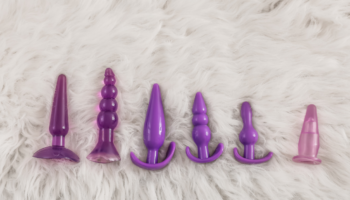Whenever a class or event is opened up to questions, I know I’ll get one about butt stuff. This is doubly true at events that allow for anonymous questions. Anal sex and anal play are incredibly common fantasies (and for good reason!) but access to shame-free and healthy information about how to start is hard to come by. And if you want to move beyond straightforward anal penetration, there’s even less information.
Unfortunately, even medical providers aren’t always well informed about sexual health around anal play. Although the CDC has recommended “Three Orifice” screening for patients with STI risk since 2006, many doctors are unfamiliar with which STIs are location specific - necessitating oral and/or anal swabs for detection.
Read: Yes, I'm a Queer Woman and, Yes, I'm on Pre-Exposure Prophylaxis (PrEP) for HIV
Until everyone can find sex-positive and fully informed health care, it’s important to educate yourself about the risks associated with your preferred forms of play so you can make fully informed choices about your safety. Being informed also allows you to advocate for yourself in healthcare settings. And while more people are now familiar with the basics of anal play safety, there are some things you may not know about a particular form of anal play, analingus (or rimming).
Top Things to Know About Anal Play Safety
While it may be the topic of giggling and blushing, oral-anal contact is not an uncommon sexual practice. But because it’s rarely talked about, the safety considerations also don’t get widely discussed.
Analingus should be considered on par risk-wise with any other form of oral sex. So, if you’d use barriers to perform oral sex on a penis or vulva, you should strongly consider using them for analingus as well. This will help protect you not only from the STIs you’ve probably heard of, but also from some of the risks specific to oral-anal contact that you may not know about.
To learn more about those risks I had a chat with Ryan Cain PA-C, MPAS, a healthcare provider with a background in preventative health. When asked about risks specific to oral-anal play he told me, “Gastrointestinal infections such as giardia, shigella, and norovirus are specific to oral-anal play [versus other forms of sex].”
Haven’t heard of some of those? Let’s break it all down a little bit.
According to the Mayo Clinic, “Giardia is an intestinal infection caused by a microscopic parasite marked by abdominal cramps, bloating, nausea and bouts of diarrhea.” And while the infection often passes on its own and is easily treated with antibiotics, there can be some lasting effects including, surprisingly, lactose intolerance.
While giardia often passes on its own and is easily treated with antibiotics, there can be some lasting effects including, surprisingly, lactose intolerance.
Read: Your Top 10 Questions About Anal Play - Answered!
Norovirus also causes, you guessed it, diarrhea, vomiting, nausea and stomach pain. But unlike giardia, there is no medication to treat norovirus, which means it can leave you very susceptible to dehydration and other complications.
Next up, shigella. According to the CDC, “shigellosis is an infectious disease caused by a group of bacteria called shigella (shih-GEHL-uh). Most who are infected with shigella develop diarrhea, fever and stomach cramps starting a day or two after they are exposed to the bacteria. Shigellosis usually resolves in 5 to 7 days. Some people who are infected may have no symptoms at all, but may still pass the shigella bacteria to others.” Furthermore, shigella is becoming multi-antibiotic resistant, so the quick fix we’re used to is becoming more complicated.
Even when treatment is a quick course of antibiotics, there can be a downside. Cain explains, “Frequent use of antibiotics contributes to the alarming global problem of antibiotic resistance that can not only affect you, but your community. Taking steps to prevent the spread of infection helps prevent the use of antibiotics and the development of resistance.”
Not only that, but frequent antibiotic use can wreak havoc on your system, knocking out “good” bacteria in your gut. To make sure your body stays balanced, Cain suggests probiotic supplements as well as “foods containing live cultures like kombucha, kimchi, kefir and yogurt.” On the subject of diet, Cain goes on to explain, “A high fiber diet is also ideal for colon health and maintaining regularity,” which can reduce the amount of pre-play cleaning and prep.
Read: How do you prepare for analingus?
Speaking of cleaning, good hygiene is always welcome before engaging in anal play. It might also help limit some bacterial transmission, as it’s fecal matter that usually harbors bacteria and parasites. A simple soap and water wash in the shower is generally enough to ensure cleanliness before sex but some people like to use an anal douche or enema as well. Just be careful. Cain cautions that like antibiotic use, “frequent douching or enemas can wipe out good bacteria in the gut which can cause bowel irregularities and make us prone to infection or imbalance leading to problems like constipation or diarrhea.”
But don’t despair! Cain says that analingus can be “just as fun and safe as other forms of sexual contact if you have the tools and knowledge that you need.” As with other forms of sex, STI and bacterial transmission can be prevented by use of barriers like dental dams. And as always, one of your best defenses is open communication with your partner. Make sure you’re discussing risk, exposure and potential symptoms as part of your safer sex talk before engaging in play.




